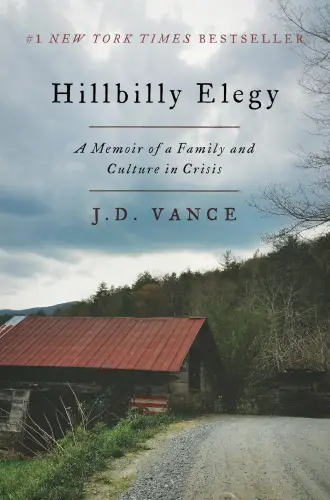Hillbilly Elegy by J. D. Vance
Book Author: J. D. Vance
Summary reviewed by:
Terrence Timmons
Terrence Timmons
Analyst
Bachelor of Arts (BA), University Of California, Santa Barbara 2019
With over 4 years of experience as an analyst. Terrence Timmons is committed to analyzing summaries without compromising on quality.
Hillbilly Elegy by J. D. Vance: Summary
What if the American Dream was a myth for an entire class of people? Hillbilly Elegy by J.D. Vance is a personal journey that doubles as an exposé of the struggles of white working-class Americans, particularly those in Appalachia. Vance, who grew up in the Rust Belt and eventually escaped poverty to graduate from Yale Law School, argues that a deep cultural crisis grips this community, where generational poverty, addiction, and lack of opportunity shape lives. The core thesis is clear: cultural and social decay, rather than pure economic disadvantage, are the real culprits trapping these communities in a cycle of dysfunction.
Underpinning Vance’s narrative are sociological insights into the "culture of poverty" theory, suggesting that the behaviors, values, and attitudes passed down in these families perpetuate their challenges. Vance’s own qualifications as a native of this community, coupled with his education, lend him the authority to analyze the mindset that hinders upward mobility. He weaves in research from sociologists and economists who study the effects of trauma and instability on childhood development, such as the Adverse Childhood Experiences (ACEs) framework, which links early life hardship to later challenges.
Personal Development & Realism:
Vance’s approach to personal development is grounded in grit and personal responsibility, emphasizing that while systemic issues like unemployment and poor education exist, individuals have the power to change their trajectory. His own life is testament to this. Escaping the cycle of poverty was no miracle—it required disciplined hard work, commitment to education, and deliberate distance from the toxic influences of his upbringing. This emphasis on self-reliance may feel controversial, but it’s one of the core takeaways: change begins with personal choice, even when systems seem stacked against you.
The outcomes Vance suggests are both personal and communal. On the individual level, he promotes education, the discipline of hard work, and seeking role models who can inspire change. However, for real societal progress, Vance stresses the need for a cultural shift, where families and communities invest in stability, strong values, and personal accountability.
Strategies for Growth & Overcoming Challenges:
In terms of strategies, Vance offers a clear framework for personal development. First, he emphasizes the importance of education as the primary tool for overcoming socioeconomic challenges, noting how his journey to Yale Law School opened up opportunities. He also advises distancing from destructive relationships and environments, as he did by moving away from his chaotic family life. Finally, he encourages the creation of strong personal networks—mentors and peers who can offer guidance and stability where one's family cannot.
The book doesn’t shy away from painful truths, nor does it offer easy answers. Vance candidly admits that many of the changes required are difficult and involve sacrifices. For instance, he talks about the need to break free from community norms that often discourage ambition and self-improvement.
Application in Everyday Life:
Vance guides the reader through actionable steps for applying these strategies, drawing on his personal experiences. He suggests that individuals must identify toxic patterns in their lives, set clear goals, and work incrementally towards breaking negative cycles. His own experience of joining the Marines to escape his environment provides a stark example of how a change in surroundings and structure can lead to a change in mindset. Tools like finding a mentor or seeking educational opportunities are highlighted, encouraging readers to take control of their destinies rather than waiting for external circumstances to change.
In conclusion, Hillbilly Elegy offers a raw look at America’s struggling white working class, blending personal narrative with broader social analysis. Vance’s message is clear: the path to personal and societal progress begins with individual choices, even amid overwhelming adversity.
Hillbilly Elegy by J. D. Vance: Genres
Memoir
Sociology
Social commentary
Political commentary
Hillbilly Elegy by J. D. Vance: Main Characters
J.D. Vance: The author and protagonist, who rises from a tumultuous childhood in Appalachia to graduate from Yale Law School. His values of hard work and perseverance are evident when he leaves his unstable home environment to join the Marines and later excel in academia.
Mamaw: Vance’s tough, no-nonsense grandmother, who provides a stable force in his otherwise chaotic life. She values loyalty and protection, demonstrated when she takes Vance in to shield him from his mother’s destructive behavior.
Bev Vance: J.D.’s mother, who struggles with addiction and instability. Despite her love for her son, she values escapism over responsibility, repeatedly entering destructive relationships and behaviors that derail her life.
Hillbilly Elegy by J. D. Vance: Themes
Cultural decay: The book discusses how generational poverty, lack of education, and substance abuse erode traditional values in Appalachia, leading to a cycle of dysfunction in families and communities.
Personal responsibility: Vance emphasizes that while systemic issues exist, individuals have the power to break free through hard work, education, and perseverance, as seen in his journey.
The impact of childhood trauma: Vance highlights how unstable family environments, domestic violence, and addiction affect children’s long-term development, affecting their ability to succeed as adults.
The American Dream: The book questions whether the ideal of upward mobility is attainable for everyone, especially for those from disadvantaged backgrounds, while offering a nuanced view of the possibilities and limitations.
Hillbilly Elegy by J. D. Vance: Methodology
Our summary of Hillbilly Elegy focuses on key themes that resonate deeply with readers, including personal responsibility, cultural decay, and the effects of childhood trauma. By highlighting the sociological and psychological underpinnings, we ensure that each critical point reflects the book's content accurately. We distill Vance’s exploration of Appalachian life, making sure to provide an engaging, informative experience without diluting the core messages.


Hillbilly Elegy by J. D. Vance
Date Published: June 28, 2016
Disclaimer: As an Amazon Associate I earn from qualifying purchases.




